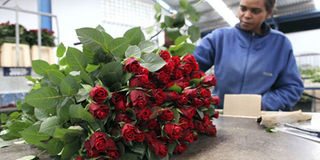Kenya’s option to safeguard European Union market

A worker arranges roses for export to the European market at the Maridadi flowers warehouse in Naivasha on April 19, 2010. Kenya is considering signing a solo agreement with European Union (EU) members to ensure farmers continue to access the key market. FILE PHOTO
What you need to know:
- KFC on Thursday warned that failure of the latest round of negotiations between the European Union and the EAC to conclude the Economic Partnership Agreement, which come up with an agreement especially on export taxes heralds difficult times for farmers.
- At the heart of the problem is the discrepancy between the EAC members, all of which are classified under the Least Developed Countries and, therefore, enjoy tax exemptions.
Kenya is considering signing a solo agreement with European Union (EU) members to ensure farmers continue to access the key market.
Kenya Flower Council (KFC) CEO Jane Ngige revealed that the government was considering opting out of the East Africa Community (EAC) agreement with EU on the matter to safeguard growers’ interest.
“All is not lost. Kenya can sign the agreement solo with the permission of the other EU members,” Ms Ngige said.
Horticultural growers are set for tough times as the October 1 deadline for finalising a partnership agreement with the EU draws closer. KFC on Thursday warned that failure of the latest round of negotiations between the European Union and the EAC to conclude the Economic Partnership Agreement, which come up with an agreement especially on export taxes heralds difficult times for farmers.
KFC said that the sector would lose up to Sh1 billion monthly if new taxes were imposed on Kenya’s exports into the EU, adding the new regime was beyond the profitability of the sector.
“The taxes would make Kenya’s horticultural products far more expensive than our biggest competitors Ethiopia and Columbia,” said KFC chairman Richard Fox, adding that the industry had intensified lobbying the government to ensure a non-disruption of business beyond the September 30 deadline.
At the heart of the problem is the discrepancy between the EAC members, all of which are classified under the Least Developed Countries and, therefore, enjoy tax exemptions.
Mr Fox said there was intense lobbying to address stalemate, but warned that time may run out.
“Farmers and traders will bear the pain because even if a solution is found, the bureaucracy of ratifying the protocol could take up to six months. If there will be no solution, investors will have to make decisions on where to invest,” Mr Fox said.
Already the industry is facing criticisms for failing to observe maximum residue levels, harmful organisms and wrong or lack of proper export documentation.
Kenya is racing against time to beat the deadline for ensuring that horticultural produce meets stringent safety standards.
The ministry has sent on compulsory leave the heads of the Horticultural Crops Development Authority and the Kenya Plant Health Inspectorate as it seeks to solve the problem.




